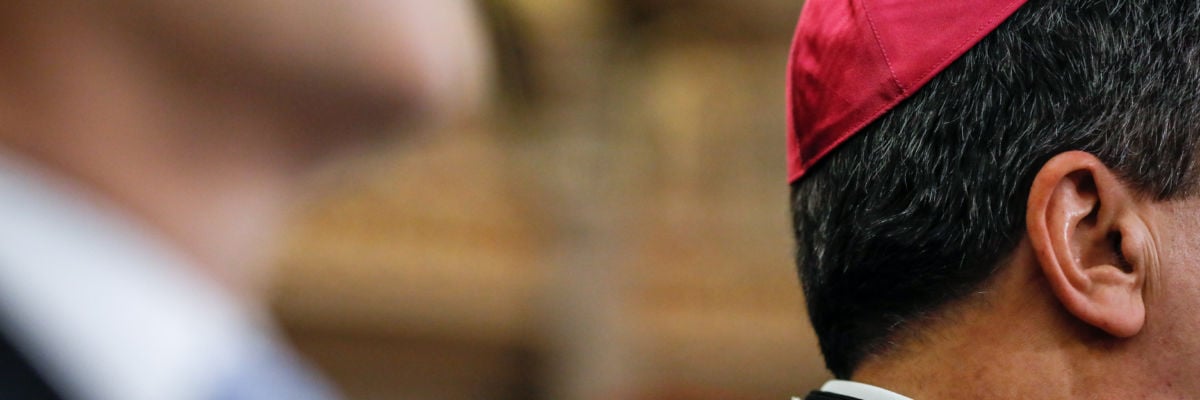
I remember talking with a seasoned Vatican-watcher, about a year ago, about who the next pope will be. We started out talking about why people talk about who the next pope will be, and why it’s okay to talk about who the next pope will be.
The occasion for our conversation was the release of a book by the eminent biographer of Pope St. John Paul II, George Weigel, offering a profile of The Next Pope. Some folks were in a tizzy over the book, especially because Ignatius Press—the publisher of the volume—reportedly sent copies of it to the members of the whole College of Cardinals, with a note from Timothy Cardinal Dolan of New York.
The National Catholic Reporter called Dolan’s letter an “apparent break with the longstanding practice that the Catholic Church’s highest prelates refrain from publicly lobbying for possible candidates for the papacy,” but it also quoted Weigel as explaining that the book “does not contain a single sentence about a future conclave,” and that “[n]o potential candidates are named and no conclave strategy is discussed.”
“The book,” Weigel told NCR, “is a reflection on the future of the Office of Peter in what Pope Francis has called a Church ‘permanently in mission.’ Period.”
The Reporter found four cardinals who “expressed concern about the propriety of a member of the elite College of Cardinals sending such a book while the current pontiff, Pope Francis, is not known to be ill or considering resignation.”
Was Dolan’s a gesture of fraternal solicitude ill judged by ungrateful recipients? Was it a well intentioned miscalculation? It certainly was cheeky. I don’t know, but I suspect that the episode didn’t hurt sales of the book.
Whatever you make of Cardinal Dolan’s gift of Weigel to the Brethren, the fact is that people are going to talk about who the next pope will be. Popes don’t live forever, and now they may even resign before they exchange time for eternity. Even if people don’t talk about it, journalists do. It’s one of our favorite things to banter about. How else will we while away the time before the press conference starts or the Very Important Meeting we’re covering breaks for coffee so we can earn our checks?
Morto un papa, se ne fa un altro. That’s Italian for “When one pope dies, another is made.” It means lots of things—that everyone is replaceable, that nothing is permanent—all indicating that, somehow . . . er . . . life goes on.
There’s nothing wrong with the exercise, merely considered and engaged in as such. It’s just something Church-watchers do. Most of the folks who complain when there’s too much public talk of the business do so because the talk is about who will replace their guy, whoever he is. That’s human nature, too. There’s a lot of that going around.
So it’s okay for anyone to speculate on the next pope. If you want to do it like the pros, though, you need to forget your theories about how or why your favorite red hat is going to get a new white zucchetto. Here are three things to keep in mind.
One is that nobody knows what’s going to happen. The Italians have another expression: Chi entra papa in conclave, ne esce cardinale. “He who goes into a conclave as pope comes out as a cardinal.”
That said, the second thing to keep in mind is that there are usually some dynamics to consider. For example, what will be the major voting blocs? Sometimes, these are designated and handicapped as “conservative” and “liberal” groupings, but those are not terribly helpful. A “liberal” in one neck of the woods may be a “conservative” in another. Then, does one intend the terms in their civil-political or their ecclesiastico-ecclesiological acceptations? The Venn diagram on that one is hardly a perfect circle.
The voting cardinals come from all around the world, and they are more interested in a candidate who either has a vision palatable to a sufficient number to get himself elected or a skill set that will make him capable of governing a big, broad Church—or both—and enough life in him to keep them from coming back too soon but not so much that they’ll all be dead or retired before then next go-round.
Roughly, geographical and linguistic blocs can sometimes either form or be created during the general congregations or the meetings in Roman restaurants before the conclave starts.
In his book on the conclave that elected Pope Francis, America’s Gerry O’Connell reported that Seán Patrick Cardinal O’Malley of Boston got ten votes on the first ballot. Lots of folks used the news to wonder whether an American might just garner enough votes to win the thing one day, but to me, it said the U.S. cardinals were telegraphing their intention to vote as a bloc, and maybe that they’d prefer a candidate with a profile not unlike O’Malley’s.
Finally, there’s a reason for the secrecy surrounding a conclave: No one likes to see how the sausage gets made. The takeaway from this tidbit of wisdom (a slight variation of one frequently though uncertainly attributed to Otto von Bismarck) is that the making of a pope is more like the making of a sausage than it is like anything else.
If that’s scandalous, well, it’s all the more reason to pray earnestly: Come, Holy Spirit!



